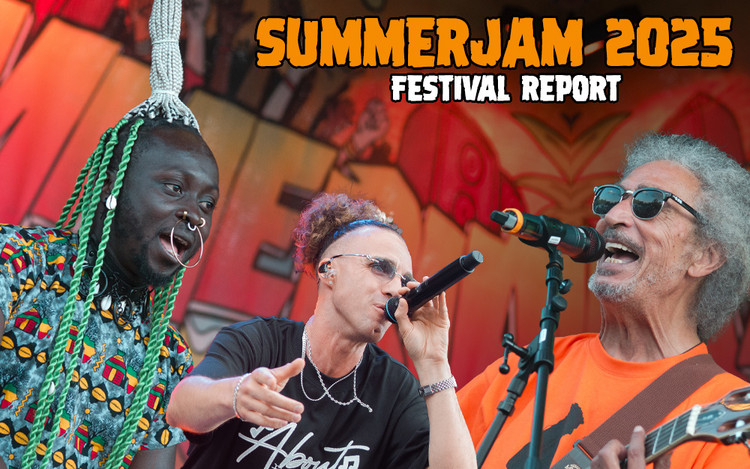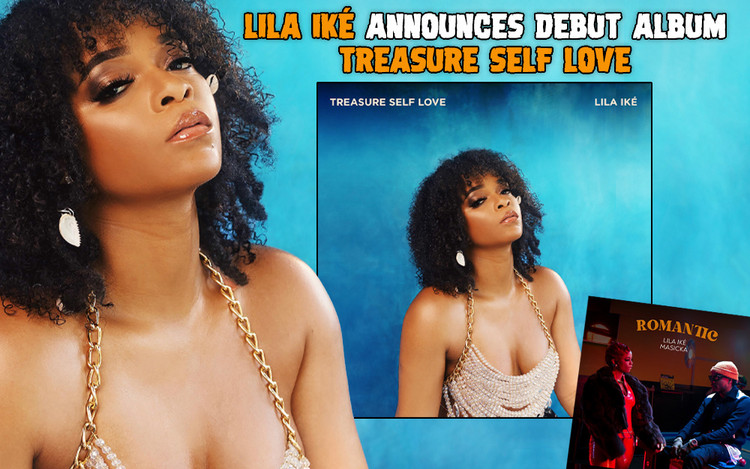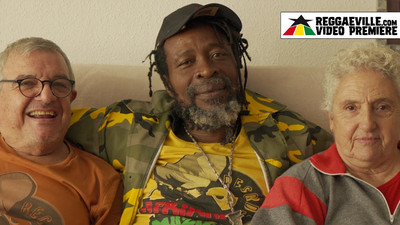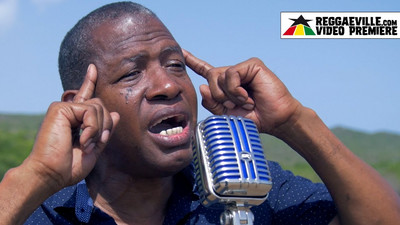Midnite ADD
Interview - Reasoning with Vaughn Benjamin from Midnite
02/05/2014 by Angus Taylor
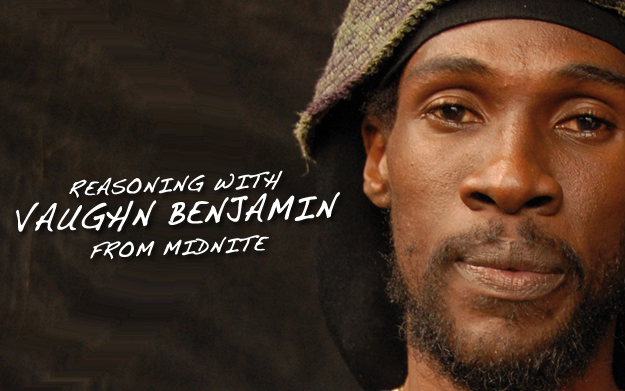
Midnite from the US Virgin Island of St Croix are not a reggae band – they are a movement, a phenomenon, a testimony to the power of being attuned to a different frequency than the rest of the world. They were formed in St Croix in the late 80s around two Rastafari brothers Vaughn and Ron Benjamin (the sons of Antiguan guitarist Ronnie Benjamin Senior), moving to Washington DC in the mid-90s and building a following based on their formidable live sound.
Since then Midnite have recorded over 50 albums in various congregations, offshoots and permutations. They have broken with some of reggae’s widely held received wisdom – cutting their initial works without post production and going to Africa before they got famous.
Sometimes Ron Benjamin produces (as with 2014’s Afrikan Roots Lab release Lion Out of Zion) but Vaughn also voices under the Midnite banner with others. The results are often Midnite’s most accessible – such as 2012’s Kings Bell for Jamaican Andrew Bassie Campbell. The latest project (likely to be one of several this year) is Beauty For Ashes which Vaughn recorded with longtime collaborator Laurent Tippy Alfred of I Grade Records. It is part of a trio of albums involving Vaughn, Tippy, the US/VI production collective Zion I Kings, Pressure from neighbouring St Thomas and Lutan Fyah. Beauty for Ashes is out on February 25th.
Vaughn Benjamin grants interviews selectively. And when he does they are similar to Midnite’s lyrics: holistic, exploratory, monumental, pulling multiple topics from the world’s vast resources of thought disciplines, just as the group can summon any number of songs from their gigantic back catalogue to their epic concerts.
This is the minimally edited transcript of our conversation – altered mainly when the Skype line failed.
Hi Vaughn – how are things in St Croix right now?
Everything is beautiful but as you know the earth is in turmoil.
There’s been a lot of talk of extreme weather in the world’s media. Have you been experiencing any extreme weather?
No, not at all. We had beautiful about 80 degrees of sunshine. But the North American continent is now colder than the North Pole. (laughs)
What do you think is the cause of this?
I think it would be common sense that it is emissions. Large factory industrial emissions would have to create something. We know just from experiments in the lab that you can create combustion in cloud from smoke. (laughs)
Yet industry is still moving forward – especially post financial crisis. There doesn’t seem to be a consensus yet that the weather is caused by emissions.
In fact people are moving forward stronger than ever. Coal and oil are more needed than ever. They are saying the green industry has failed before they tried long and hard enough. But we can only deal with the consensus that there is. We can only accept what is reality. But it would be a good thing if minds would come together – I know it’s not a simplistic problem, it’s much more intricate than the things we are saying here. Because if you take away the energy sources that are being used right now there is nothing to appropriately replace them.
Yes, the energy solutions are a combination of sources. This is very like your new album Beauty For Ashes. Midnite has always been collaborative but this project seems especially collaborative: with other vocalists Pressure, Lutan Fyah and Batch; with multiple producers Tippy I, Jah David and Andrew Moon Bain – the Zion I Kings; and in lots of locations – Tuff Gong, St Croix, Miami. It’s like a miniature eco system of musical interaction.
Yes yes yes. It’s a fusing and a melding of the talents and abilities and links and thoughts and creativities that there is. It’s about co-existence. It’s a smaller model. It’s a micro of a society really. Some of us are just learning to do it but we have to learn to do it. (laughs)
Interaction, interconnection, collaboration and connectivity – these seem to be common themes throughout the lyrics of Beauty for Ashes.
It’s a fact of the universe. We can either try to exist outside of that and still be forced to. Just traffic will prove it. So it’s a fact. It’s just how well we can make creativity and positivity come out of it.
There is a lot of creativity coming out of I Grade records right now. There are two other albums coming – The Sound by Pressure and Music Never Dies by Lutan Fyah. Were they all being worked on simultaneously – was there any sense of “this is going to be for my album” or “this is going to be for yours”?
No, there was no actual discussion of that at all. That’s usually the way it is. We make music and then we see what happens! (laughs)
How would you describe the time you all spent together?
Ah! I think in a world where you have comparison and competitiveness as just a fact of life – we didn’t have much of that whatsoever. We had really easy work and I think Rastafari is the unifying factor. Because we already know what’s acceptable and what’s unacceptable and most of us know not to put yourself somewhere where your heart doesn’t want to be. So that’s what I felt from the others too. They were here happy to do this and it happened quite quickly every time.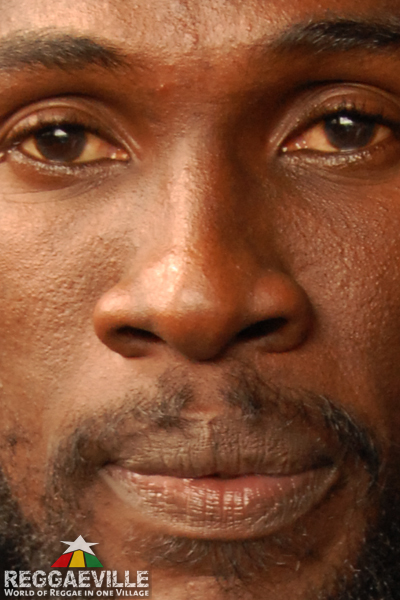 I don’t want to dwell on the prolific nature of your work because it’s something you get asked about a lot – but is this your 50th album? I read different numbers from different sources.
I don’t want to dwell on the prolific nature of your work because it’s something you get asked about a lot – but is this your 50th album? I read different numbers from different sources.
I think it’s more than 50. To be honest there are many albums unreleased too so that’s why I haven’t made it an issue.
Are numerical milestones of interest to you?
Not at all. Just the biblical scripture: “Give unto Jah all the strength of your youth while the evil days come not. Then He shall say ‘I find no fault in you’.” So certain scriptures leave a milestone for how to go about and how to conduct your try or your attempt. I don’t know particularly so I’m just giving it the stress that I have.
For example people saying “this is a new year” “happy new year” and so on. Do you see any significance in that?
I’m not too sentimental in such fashions. Every day of 365 - as they count it in the Gregorian calendar – is an opportunity to do something good when you really appreciate life. When you really are glad for the chance and when you really overstand - in the context of how many people live and die and have misfortune on a daily basis - just to be healthy and to have a try is an opportunity within itself. So if you have that kind of approach it’s always bright.
I’m going to ask you about some of the principal characters in this collaboration. Do you remember first meeting Tippy? What were your first impressions?
I met Tippy through friends we had in common – like end of 2000-99. I knew of him before I knew him personally so I knew he was an excellent child, a good student and a really good swimmer and all of the above. That did play a part in my deciding to work with him because I knew he had already given himself to discipline before, so chances are he would do it again. Life is a constant development and everyone is a work in progress. So if you see someone to be diligent and interested and enthusiastic and so forth those are pretty good signs. That’s my temperament – I’m enthusiastic about music, about The King’s work, about making better social situations for the earth.
Can you tell me how you met Lutan Fyah? He told us in a previous interview that he met you quite a long time ago.
(laughs) I met Lutan Fyah by phone call before I met him personally. It was a good and a positive thing and I got to know that he had been exposed to work which we had been doing. Then I listened to his work too and realised that he is somebody really trying to do something upful and good and strong so that was good enough for me. The world has a magnetic word and this is what draws people to around each other – similarity of purpose and so forth.
Can you tell me how you met Pressure?
Well as a young man I saw Pressure with Star Lion Family in the VI when they were seven young men together doing really good work. And we just clicked as people, so he would come over from St Thomas and stay with me in St Croix for a long time so we collaborated before these works too. Just a natural friendship really. People who just gravitated. I saw that he had a real introspection young – without lights camera action. He was interested and he could sustain his ideas and thoughts to dig deeper and explore. I knew that personal interest – that zeal.
When you say “without lights camera action” - can you explain?
Well before there is hype and many people who appreciate what you do and know who you are. Because when you are very zealous and interested before that, it means that’s a real strong thing inside of you – it’s not caused by the exterior, it’s from the interior. (laughs)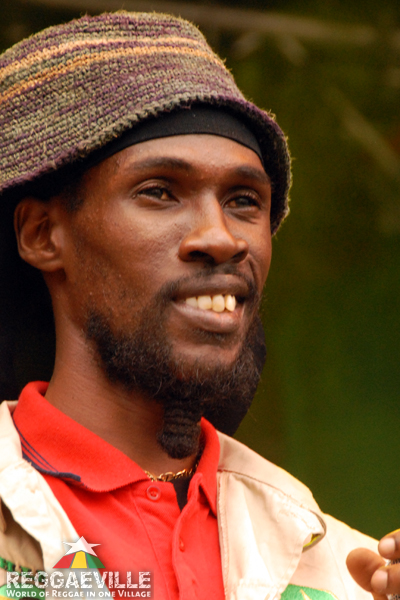 Last time we spoke we talked about the importance of introspection.
Last time we spoke we talked about the importance of introspection.
In the lyrics to the song Same I Ah One you begin by saying "to introspect from humane reasons" – can you elaborate?
When you look at the world situation today and feel the pain of when you see families in chaos and crisis and war and poverty and hunger and disease – just being human yourself, each human should be able to relate. So that’s what introspection from humane reasons means to me – to really think “What would it be like to really experience this?” and feel the pain of someone else for a minute so that we can know how to make better decisions about people not being in such situations. Even though that is a bit idealistic so we know what the world is today – but we have to make that choice.
So it’s about holding on to your empathy.
Yes, very important.
You say humanity is one. Yet right now people are being treated more differently than ever. The gap between rich and poor people and countries is wider. How do you counteract that?
Well, you know the old biblical story that man is separated by the tongue at Babylon [Babel] and if you see today it’s more about classism. It’s a more classist than racist war, even though racism is still involved big time. But it’s about people who like or dislike people based upon their practices and based upon their wealth. That’s what happening on earth. You counteract it by what the scripture has admonished us from the beginning – “Let your light so shine and people will see your good work and glorify the good – that you represent your father”. So if we say words and platitudes and ideals and philosophies and there is no living sign of them within what we do – then – the strength of the word is the deed so without the deed you don’t even get to own the land. (laughs)
Yes, I see what you did there. In the song A Reminder you say “Compassion for the weak is backbone of society”. Yet in Europe, benefits for the less fortunate are being cut due to austerity measures.
Typically we think of the weakest in a society as being people who are infirm or sick or old. But the weakest in this society is the new-born baby. So if you see that the world is in simultaneous birth-rate decline Europe is, the UK is, I’m saying the attitude has its societal parallel. And it’s a basic fact that you need to replace at least your present population. And if you see or know the statistics today most nations today are saying they are not able to replace the present population right now.
You think humanity is in danger of extinction?
I think that what made us all as many nations, most nations will not accept - one name as serving all the nations. So whatever that power is that brought us into being from void – and we say that power is Haile Selassie I the First Rastafari – whatever that power is to all the rest of the world it still is that power. It still sends presidents and prime ministers and kings to run for their raincoats and their winter jackets and their boots! (laughs) So as far as I know we’re still in that everlasting province. Because it’s a very strange thing to be on a globe spinning. And there are seven more that they showed us on a chart in school. But then we talk about going to outer space – I don’t know what that means when we’re on top of a ball spinning too. Because my son asked me that – “What do they mean? Aren’t we one of the balls? Aren’t we one of the planets too?”
If you were offered the opportunity to travel to another planet would you accept it?
If it was validly known to be existent and if Rastafari himself told me “We are there” I am going!
But if for example space tourism became affordable to the whole population would you be interested in going and seeing the earth from above?
To be serious it’s not something that I’ve thought of doing because if I look above my head I can see the orbit that is the sun and yet it is so many billion miles away that my eyes are like so much more high tech than the Hubble telescope. (laughs) It’s cosmic dust that I am breathing right now – from where I do not know. So then when Yeshua Christ said “Know ye not that ye are all gods?” it kind of becomes relevant and parallel on earth to see that we are living ones speaking to each other right now – but we are on a ball spinning and there are a bunch more of them. Galaxies. It’s infinite. It’s not a foolish thing to explore your neighbourhood and what’s around you. (laughs)
Another lyric from Same I Ah One says “World needs some conscience to be fair to woman”. Would you consider yourself a feminist? And if not – what do you think of feminism?
Well as far as I know an equation of 50% and 50% is equal. And just because that when these two come together not as differences but as complementary opposites – they create life. So that is my position. 50% is not 80/20, it’s not 70/30 or 60/40 – it’s 50 and 50 and it’s just that simple for me. I don’t have particularly the idea. I know that roles may be different and physical strength and so forth but I know that common sense is to see that 50 and 50 makes 100.
Most feminists would say feminism is about being equal. Why do you think people who agree with the tenets do not take the label?
Because if we took the label masculinism that would be unequal in balance about what there really is. So any such terms that try to encompass the entire would have to be somehow reflecting the entire. This is the problem where I sang the song Electron in the Spin – “Why is everything named after the negative charge?” (laughs) It’s very strange.
In a previous interview you talked about information and knowledge – what is the difference?
A book is full of information but it is non interactive. Since life is an interactive living thing –much the same way The Book says “Day after day uttereth speech”, interactive living word is always more indicative of present tense than static, dead or written out word. So the interactivity of sound and word is more “knowledge” than what’s written down. Because if there is a sudden shift in the earth’s axis and temperate zones become suddenly totally changed then a lot of old “information” will become irrelevant in countries that had this as their stationary information – they would have to make adjustments in all of their new publications. (laughs) It would no longer be knowledge it would be information. I think the increase of accessibility to information has affected the consensus knowledge. Now there are a million explanations and definitions on the net and you do not know which is truer.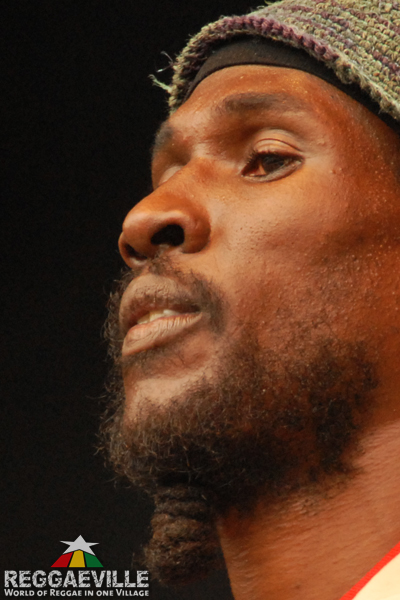 In our last discussion you talked about how the media is a soundbite and is reductive. The internet means that this interview we are doing does not have to be edited in the way that a print magazine would – I don’t have to compress what you say to fit onto a page. So this gives us a freedom to talk at length and if people are willing to read they can. On the other hand because of social media habits people’s appetite for reading seems to be going down. People prefer to read lists of the 10 best this or the 53 most interesting that. So these two things seem to be happening at the same time.
In our last discussion you talked about how the media is a soundbite and is reductive. The internet means that this interview we are doing does not have to be edited in the way that a print magazine would – I don’t have to compress what you say to fit onto a page. So this gives us a freedom to talk at length and if people are willing to read they can. On the other hand because of social media habits people’s appetite for reading seems to be going down. People prefer to read lists of the 10 best this or the 53 most interesting that. So these two things seem to be happening at the same time.
That’s right. I think that’s by design even though ultimately it will still be positive. The information of the whole world is fusing – food, clothing, law, everything. That is where a lot of the social unrest is coming from too – from the fusing of what is international morality. Whether they are aware of it or not, everyone is seeking for what is the international norm – well established family, what’s a good standard of living and so forth. So the more that the impoverished of the earth become exposed to this is the more that they’ll demand it. (laughs)
In terms of secondary sources for your topics - do you prefer to use books or the internet?
I think the books will win in the long run every time. I think the internet is quick access. I think that all the tools on the field are present so you use whichever tool works.
When you write do you tend to start with a single topic and expand into multiple topics or do you have many topics in mind that you wish to connect?
Sometimes I’m a bit apprehensive to tell you how it happens! It happens in a barrage. It happens very quickly. I’m sure Tippy will tell you. For years I’ve tried to make a formula out of it but I don’t know what to tell you. I think because I study and I’m very introspective away from studio, when I get there maybe it’s already waiting – I don’t know.
I saw you at Summerjam 2012 when you did a press conference facing questions by a range of media who were not necessarily familiar with you or your music. Was that an example of the media trying to condense your messages to a soundbite? Was that an experience you had had before and what did you think of it?
That was not too common an event and it’s not something that I make myself too exposed to. Because I’m not necessarily trying to convince or to thought project into people’s minds. I look for more receptability. People who are more receptive and who are interested themselves. Because we know anything that forces itself - anything that uses thought projection or tries to get over - it is inevitable that there will be a clash of some sort. Because someone has not allowed you into their thought and spirit.
I remember one of the reporters asked you whether you would be interested in donating to a specific charity at the festival and, to paraphrase, you said charity wasn’t a specific act or gesture.
Yes, that is true. And I was very astounded because of the way we grew up. Like if we gave something to someone you never went down the street and said “Oh, I gave him that shirt”. There would be a fight! “You’re embarrassing me just because you helped me?” And it was very unusual to me that there are people to whom there are no sensitivities involved in these things. It’s disrespectful to the poor, infringing on their dignity that just because I did help you now everyone has to know you didn’t earn that.
This time last year you went on a tour of Costa Rica with what are now considered the young lions of Jamaica’s reggae revival. Several of them have spoken of you. How was it from your perspective?
It was a very, very good experience. Very positive for me. They were very open minded and friendly and social and they really wanted to discuss and spend regular human time. And as far as their abilities, I think they are as good as they are being hyped. I think Jah9 is a particularly unusual height of introspection. I think Chronixx has a very, very easy easy beautiful style and voice. He does it easy by his spirit. With Protoje and all of them being young people – anything could happen – to the sky. So it was a very good interaction.
It’s interesting that you mentioned Jah9 first as she is someone else who when being interviewed refuses to be compressed into a soundbite.
Well this is what I’m saying. Also just from the word, the word reveals. Just by listening to the word you know the depth of thought.
The international community feels very positive about these artists – but for many years some have been saying that VI reggae is the inheritor of the original roots music from Jamaica. VI reggae is perceived to be authentic – what do you think of this and the concept of authenticity in music and in life in general?
I would respond how Christ responded to Rome – I would say “You said so!” (laughs) When they asked him “Are you the King?” he said “You said so”. (laughs) It’s beautiful. I’m just smiling listening to you. Because whenever the people speak, that’s more powerful than any pundits and industry and anything. We don’t know anyone’s potential. We don’t know what can happen. Anything can happen. Any one of these young beautiful lives can create a big cohesion around the world.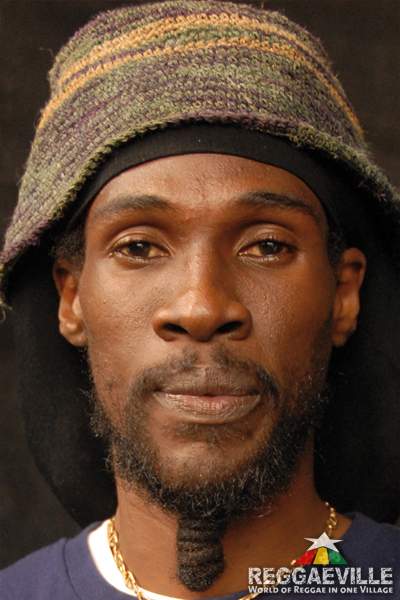 Many roots reggae artists get asked the question “You sing about Africa - when are you going to Africa?” But you went Africa early in your career. What has that given you compared to those who sing but have not been?
Many roots reggae artists get asked the question “You sing about Africa - when are you going to Africa?” But you went Africa early in your career. What has that given you compared to those who sing but have not been?
Well you know that human beings will tend to be more idealistic about some things we are not totally exposed to. But I know what’s demanded in terms of work to change mindsets and to overstand the whole interconnectivity of how the cycles are – from heat, air and water. Societies are now embracing these concepts – even in recycling where nothing goes to waste, it’s just a constant cycle of the elements. I don’t think that’s too cutting edge for my people in Africa. I think that His Majesty also discussed this – that the cutting edge of technology should be made available to all peoples and thereby lessen that jealousy and that envious covetous kind of spirit that will clamour after it if they can’t get it. But I thank Jah for the people who made these things happen at such points because they made I to be very well exposed in a physical sense – not from having read. But when I got to Africa I had some very high experiences. I felt some powerful connections and the people made me feel very welcome in Namibia. There was even talk about staying and what we could do at university and so forth. So it was good and I just still know that the knowledge His Majesty leaves me here can still travel around and create a world conducive to people who are receptive to what’s now possible – without hurting people. His Majesty says that technology should be for the wellbeing of man solely. That’s what I’m thinking.
You often sing about popular culture in your lyrics. You have talked before about how the popular can inspire as much as the highbrow. Have you been watching the Hobbit films?
I have taken some glimpses of it here and there. I can’t say I’ve watched it in entirety. I do think it’s very, very interesting writing with a lot of parallels about the different appearances of the people who have to come together to help each other. I think it’s just a microcosm of the real world situation.
You sing. You write. You have made videos. Would you ever move into cinema?
I haven’t explored that too much as a thought but any place that I could be good and instrumental – if something is good then it doesn’t need to be hidden. So who knows? But I’ve often hoped that people would sit and really talk. World leaders – anyone. Really have a real talk. Like how Bob Marley said “Have a talk with the boss”. (laughs) That’s what I would like to see because that’s what His Majesty would like to see too. Nations interact and talk and create peace through social interactions and rituals and ceremonies and circumstance.





